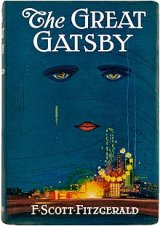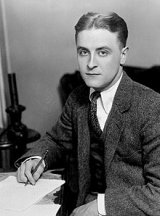The Great Gatsby Page #6
The Great Gatsby is a 1925 novel by American writer F. Scott Fitzgerald. Set in the Jazz Age on Long Island, near New York City, the novel depicts first-person narrator Nick Carraway's interactions with mysterious millionaire Jay Gatsby and Gatsby's obsession to reunite with his former lover, Daisy Buchanan. The novel was inspired by a youthful romance Fitzgerald had with socialite Ginevra King, and the riotous parties he attended on Long Island's North Shore in 1922
hour. There is always a halt there of at least a minute, and it was because of this that I first met Tom Buchanan’s mistress. The fact that he had one was insisted upon wherever he was known. His acquaintances resented the fact that he turned up in popular cafés with her and, leaving her at a table, sauntered about, chatting with whomsoever he knew. Though I was curious to see her, I had no desire to meet her—but I did. I went up to New York with Tom on the train one afternoon, and when we stopped by the ash-heaps he jumped to his feet and, taking hold of my elbow, literally forced me from the car. “We’re getting off,” he insisted. “I want you to meet my girl.” I think he’d tanked up a good deal at luncheon, and his determination to have my company bordered on violence. The supercilious assumption was that on Sunday afternoon I had nothing better to do. I followed him over a low whitewashed railroad fence, and we walked back a hundred yards along the road under Doctor Eckleburg’s persistent stare. The only building in sight was a small block of yellow brick sitting on the edge of the waste land, a sort of compact Main Street ministering to it, and contiguous to absolutely nothing. One of the three shops it contained was for rent and another was an all-night restaurant, approached by a trail of ashes; the third was a garage—Repairs. George B. Wilson. Cars bought and sold.—and I followed Tom inside. The interior was unprosperous and bare; the only car visible was the dust-covered wreck of a Ford which crouched in a dim corner. It had occurred to me that this shadow of a garage must be a blind, and that sumptuous and romantic apartments were concealed overhead, when the proprietor himself appeared in the door of an office, wiping his hands on a piece of waste. He was a blond, spiritless man, anaemic, and faintly handsome. When he saw us a damp gleam of hope sprang into his light blue eyes. “Hello, Wilson, old man,” said Tom, slapping him jovially on the shoulder. “How’s business?” “I can’t complain,” answered Wilson unconvincingly. “When are you going to sell me that car?” “Next week; I’ve got my man working on it now.” “Works pretty slow, don’t he?” “No, he doesn’t,” said Tom coldly. “And if you feel that way about it, maybe I’d better sell it somewhere else after all.” “I don’t mean that,” explained Wilson quickly. “I just meant—” His voice faded off and Tom glanced impatiently around the garage. Then I heard footsteps on a stairs, and in a moment the thickish figure of a woman blocked out the light from the office door. She was in the middle thirties, and faintly stout, but she carried her flesh sensuously as some women can. Her face, above a spotted dress of dark blue crêpe-de-chine, contained no facet or gleam of beauty, but there was an immediately perceptible vitality about her as if the nerves of her body were continually smouldering. She smiled slowly and, walking through her husband as if he were a ghost, shook hands with Tom, looking him flush in the eye. Then she wet her lips, and without turning around spoke to her husband in a soft, coarse voice: “Get some chairs, why don’t you, so somebody can sit down.” “Oh, sure,” agreed Wilson hurriedly, and went toward the little office, mingling immediately with the cement colour of the walls. A white ashen dust veiled his dark suit and his pale hair as it veiled everything in the vicinity—except his wife, who moved close to Tom. “I want to see you,” said Tom intently. “Get on the next train.” “All right.” “I’ll meet you by the newsstand on the lower level.” She nodded and moved away from him just as George Wilson emerged with two chairs from his office door. We waited for her down the road and out of sight. It was a few days before the Fourth of July, and a grey, scrawny Italian child was setting torpedoes in a row along the railroad track. “Terrible place, isn’t it,” said Tom, exchanging a frown with Doctor Eckleburg. “Awful.” “It does her good to get away.” “Doesn’t her husband object?” “Wilson? He thinks she goes to see her sister in New York. He’s so dumb he doesn’t know he’s alive.” So Tom Buchanan and his girl and I went up together to New York—or not quite together, for Mrs. Wilson sat discreetly in another car. Tom deferred that much to the sensibilities of those East Eggers who might be on the train. She had changed her dress to a brown figured muslin, which stretched tight over her rather wide hips as Tom helped her to the platform in New York. At the newsstand she bought a copy of Town Tattle and a moving-picture magazine, and in the station drugstore some cold cream and a small flask of perfume. Upstairs, in the solemn echoing drive she let four taxicabs drive away before she selected a new one, lavender-coloured with grey upholstery, and in this we slid out from the mass of the station into the glowing sunshine. But immediately she turned sharply from the window and, leaning forward, tapped on the front glass. “I want to get one of those dogs,” she said earnestly. “I want to get one for the apartment. They’re nice to have—a dog.” We backed up to a grey old man who bore an absurd resemblance to John D. Rockefeller. In a basket swung from his neck cowered a dozen very recent puppies of an indeterminate breed. “What kind are they?” asked Mrs. Wilson eagerly, as he came to the taxi-window. “All kinds. What kind do you want, lady?” “I’d like to get one of those police dogs; I don’t suppose you got that kind?” The man peered doubtfully into the basket, plunged in his hand and drew one up, wriggling, by the back of the neck. “That’s no police dog,” said Tom. “No, it’s not exactly a police dog,” said the man with disappointment in his voice. “It’s more of an Airedale.” He passed his hand over the brown washrag of a back. “Look at that coat. Some coat. That’s a dog that’ll never bother you with catching cold.” “I think it’s cute,” said Mrs. Wilson enthusiastically. “How much is it?” “That dog?” He looked at it admiringly. “That dog will cost you ten dollars.” The Airedale—undoubtedly there was an Airedale concerned in it somewhere, though its feet were startlingly white—changed hands and settled down into Mrs. Wilson’s lap, where she fondled the weatherproof coat with rapture. “Is it a boy or a girl?” she asked delicately. “That dog? That dog’s a boy.” “It’s a bitch,” said Tom decisively. “Here’s your money. Go and buy ten more dogs with it.” We drove over to Fifth Avenue, warm and soft, almost pastoral, on the summer Sunday afternoon. I wouldn’t have been surprised to see a great flock of white sheep turn the corner. “Hold on,” I said, “I have to leave you here.” “No you don’t,” interposed Tom quickly. “Myrtle’ll be hurt if you don’t come up to the apartment. Won’t you, Myrtle?” “Come on,” she urged. “I’ll telephone my sister Catherine. She’s said to be very beautiful by people who ought to know.” “Well, I’d like to, but—” We went on, cutting back again over the Park toward the West Hundreds.
Translation
Translate and read this book in other languages:
Select another language:
- - Select -
- 简体中文 (Chinese - Simplified)
- 繁體中文 (Chinese - Traditional)
- Español (Spanish)
- Esperanto (Esperanto)
- 日本語 (Japanese)
- Português (Portuguese)
- Deutsch (German)
- العربية (Arabic)
- Français (French)
- Русский (Russian)
- ಕನ್ನಡ (Kannada)
- 한국어 (Korean)
- עברית (Hebrew)
- Gaeilge (Irish)
- Українська (Ukrainian)
- اردو (Urdu)
- Magyar (Hungarian)
- मानक हिन्दी (Hindi)
- Indonesia (Indonesian)
- Italiano (Italian)
- தமிழ் (Tamil)
- Türkçe (Turkish)
- తెలుగు (Telugu)
- ภาษาไทย (Thai)
- Tiếng Việt (Vietnamese)
- Čeština (Czech)
- Polski (Polish)
- Bahasa Indonesia (Indonesian)
- Românește (Romanian)
- Nederlands (Dutch)
- Ελληνικά (Greek)
- Latinum (Latin)
- Svenska (Swedish)
- Dansk (Danish)
- Suomi (Finnish)
- فارسی (Persian)
- ייִדיש (Yiddish)
- հայերեն (Armenian)
- Norsk (Norwegian)
- English (English)
Citation
Use the citation below to add this book to your bibliography:
Style:MLAChicagoAPA
"The Great Gatsby Books." Literature.com. STANDS4 LLC, 2025. Web. 23 Feb. 2025. <https://www.literature.com/book/the_great_gatsby_1598>.








Discuss this The Great Gatsby book with the community:
Report Comment
We're doing our best to make sure our content is useful, accurate and safe.
If by any chance you spot an inappropriate comment while navigating through our website please use this form to let us know, and we'll take care of it shortly.
Attachment
You need to be logged in to favorite.
Log In